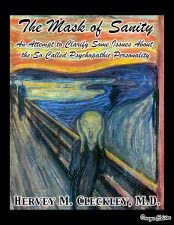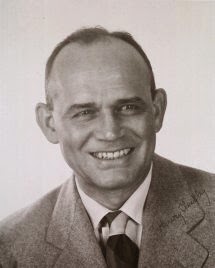| Online: | |
| Visits: | |
| Stories: |

| Story Views | |
| Now: | |
| Last Hour: | |
| Last 24 Hours: | |
| Total: | |
Ufology and The Mask of Sanity
Before I was in college — much before — I came across a book in my local library: The Caricature of Love by Hervey Cleckley, a tome outlining the deviancy of homosexuality, which is still applicable today.
When I was in college, one of my psychology professors recom- mended Hervey Cleckley's The Mask Of Sanity.
This is Wikepedia's opening on Dr. Cleckley and his book:
Hervey Milton Cleckley (1903 – January 28, 1984) was an American psychiatrist and pioneer in the field of psychopathy. His book, The Mask of Sanity, originally published in 1941 and revised in new editions until the 1980s, provided the most influential clinical description of psychopathy in the twentieth century. The term “mask of sanity” derived from Cleckley's belief that a psychopath can appear normal and even engaging, but that the “mask” conceals a mental disorder.
I got the book and have voraciously used it in my associations with people, especially UFO-oriented people.
UFO researchers, had they read the book before they got involved with UFO witnesses and alleged UFO abductees, and the Roswell gaggle, they'd have been able to eliminate much of the grist and lies foisted upon them by psychopathic personalities, just as I avoid those in the UFO community who are psychopathic.
Dr. Cleckley's insights are essential for cleansing UFO lore and the community itself of deviant or sociopathic people.
From the book, a listing if traits one should look for when evaluating a subject (a UFO witness for example) or a UFO researcher (such as Philip Imbrogno, unmasked by Lance Moody):
1. Superficial charm and good “intelligence”
2. Absence of delusions and other signs of irrational thinking
3. Absence of “nervousness” or psychoneurotic manifestations
4. Unreliability
5. Untruthfulness and insincerity
6. Lack of remorse or shame
7. Inadequately motivated antisocial behavior
8. Poor judgment and failure to learn by experience
9. Pathologic egocentricity …
10. General poverty in major affective reactions
11. Specific loss of insight
12. Unresponsiveness in general interpersonal relations
13. Fantastic and uninviting behavior with or without drink
14. Suicide rarely carried out
15. Sex life impersonal, trivial, and poorly integrated
16. Failure to follow any life plan
More often than not, the typical psychopath will seem particularly agreeable and make a distinctly positive impression when he is first encountered. Alert and friendly in his attitude, he is easy to talk with and seems to have a good many genuine interests.
There is nothing at all odd or queer about him, and in every respect he tends to embody the concept of a well-adjusted, happy person. Nor does he, on the other hand, seem to be artificially exerting himself like one who is covering up or who wants to sell you a bill of goods. He would seldom be confused with the professional backslapper or someone who is trying to ingratiate himself for a concealed purpose.
Signs of affectation or excessive affability are not characteristic. He looks like the real thing.
Very often indications of good sense and sound reasoning will emerge and one is likely to feel soon after meeting him that this normal and pleasant person is also one with high abilities. Psychometric tests also very frequently show him of superior intelligence. More than the average person, he is likely to seem free from social or emotional impediments, from the minor distortions, peculiarities, and awkwardnesses so common even among the successful. Such superficial characteristics are not universal in this group but they are very common.
After being caught in shameful and gross falsehoods, after repeatedly violating his most earnest pledges, he finds it easy, when another occasion arises, to speak of his word of honor, his honor as a gentleman, and he shows surprise and vexation when commitments on such a basis do not immediately settle the issue.
The conception of living up to his word seems, in fact, to be regarded as little more than a phrase sometimes useful to avoid unpleasantness or to gain other ends.
That UFO researchers do not have the qualifications, usually, to pursue personalities lies at the heart of the UFO dilemma, as it's UFO reports that make up the core of the UFO story, and that core is besotted by liars or psychotic personalities, telling the stories or asking the questions.
Take a look at the comments inside Kevin Randle's blog and other UFO venues and you'll find palpable examples of what Dr. Cleckley was writing about.
Get the book, read it, and see for yourself that the icons of Ufology are as flawed, maybe more so, than those who've gulled us all with their made-up stories and misperceptions.
RR http://ufocon.blogspot.com – The UFO Iconoclast(s)
Source: http://ufocon.blogspot.com/2015/01/ufology-and-mask-of-sanity.html





